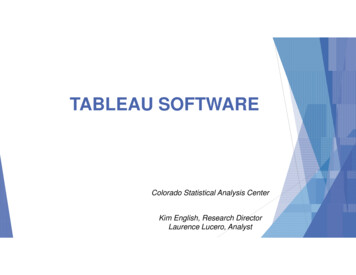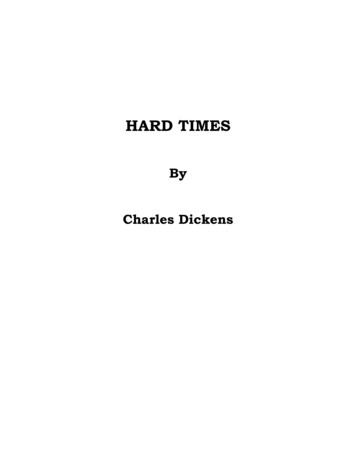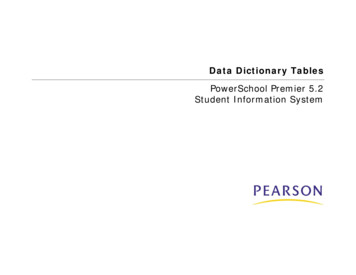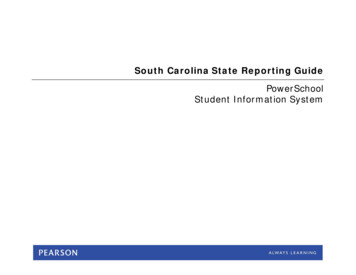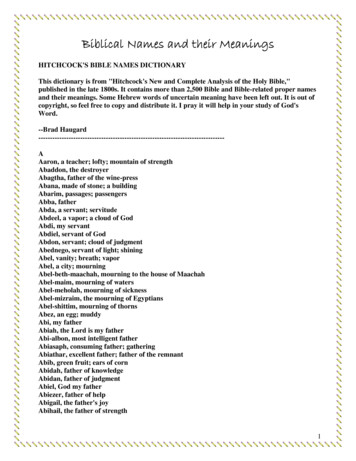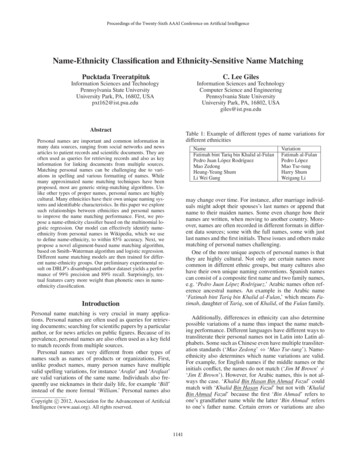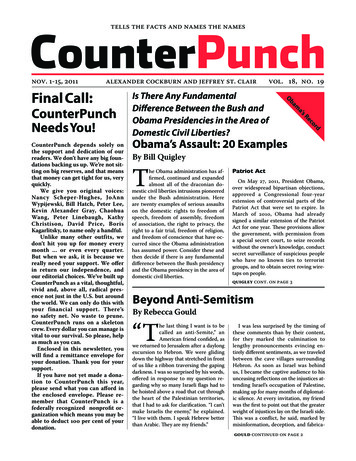
Transcription
Tells the Facts and Names the NamesNov. 1-15, 2011Alexander Cockburn and Jeffrey St. ClairdorecRa’smCounterPunch depends solely onthe support and dedication of ourreaders. We don’t have any big foundations backing us up. We’re not sitting on big reserves, and that meansthat money can get tight for us, veryquickly.We give you original voices:Nancy Scheper-Hughes, JoAnnWypijewski, Bill Hatch, Peter Lee,Kevin Alexander Gray, ChaohuaWang, Peter Linebaugh, KathyChristison, David Price, BorisKagarlitsky, to name only a handful.Unlike many other outfits, wedon’t hit you up for money everymonth . or even every quarter.But when we ask, it is because wereally need your support. We offerin return our independence, andour editorial choices. We’ve built upCounterPunch as a vital, thoughtful,vivid and, above all, radical presence not just in the U.S. but aroundthe world. We can only do this withyour financial support. There’sno safety net. No waste to prune.CounterPunch runs on a skeletoncrew. Every dollar you can manage isvital to our survival. So please, helpas much as you can.Enclosed in this newsletter, youwill find a remittance envelope foryour donation. Thank you for yoursupport.If you have not yet made a donation to CounterPunch this year,please send what you can afford inthe enclosed envelope. Please remember that CounterPunch is afederally recognized nonprofit organization which means you may beable to deduct 100 per cent of yourdonation.baCounterPunchNeeds You!Is There Any FundamentalDifference Between the Bush andObama Presidencies in the Area ofDomestic Civil Liberties?OFinal Call:vol. 18, no. 19Obama’s Assault: 20 ExamplesBy Bill QuigleyThe Obama administration has affirmed, continued and expandedalmost all of the draconian domestic civil liberties intrusions pioneeredunder the Bush administration. Hereare twenty examples of serious assaultson the domestic rights to freedom ofspeech, freedom of assembly, freedomof association, the right to privacy, theright to a fair trial, freedom of religion,and freedom of conscience that have occurred since the Obama administrationhas assumed power. Consider these andthen decide if there is any fundamentaldifference between the Bush presidencyand the Obama presidency in the area ofdomestic civil liberties.Patriot ActOn May 27, 2011, President Obama,over widespread bipartisan objections,approved a Congressional four-yearextension of controversial parts of thePatriot Act that were set to expire. InMarch of 2010, Obama had alreadysigned a similar extension of the PatriotAct for one year. These provisions allowthe government, with permission froma special secret court, to seize recordswithout the owner’s knowledge, conductsecret surveillance of suspicious peoplewho have no known ties to terroristgroups, and to obtain secret roving wiretaps on people.Quigley cont. on Page 3Beyond Anti-SemitismBy Rebecca Gould“The last thing I want is to becalled an anti-Semite,” anAmerican friend confided, aswe returned to Jerusalem after a daylongexcursion to Hebron. We were glidingdown the highway that stretched in frontof us like a ribbon traversing the gapingdarkness. I was so surprised by his words,offered in response to my question regarding why so many Israeli flags had tobe hoisted above a road that cut throughthe heart of the Palestinian territories,that I had to ask for clarification. “I can’tmake Israelis the enemy,” he explained.“I live with them. I speak Hebrew betterthan Arabic. They are my friends.”I was less surprised by the timing ofthese comments than by their content,for they marked the culmination tolengthy pronouncements evincing entirely different sentiments, as we traveledbetween the cave villages surroundingHebron. As soon as Israel was behindus, I became the captive audience to hisunceasing reflections on the injustices attending Israel’s occupation of Palestine,making up for many months of diplomatic silence. At every invitation, my friendwas the first to point out that the greaterweight of injustices lay on the Israeli side.This was a conflict, he said, marked bymisinformation, deception, and fabricagould conTinued on Page 2
nov. 1-15, 2011tions of the past, and the winners weremore culpable than the losers. “Israel exists only on subsidies,” he repeated tirelessly, stressing the violence the state ofIsrael had introduced into the economyof the Levant. By contrast, Palestine wasan “artificially underdeveloped economy” forced into economic depression byIsrael’s draconian policies.And now, at the conclusion to a journey that had exposed me to a hithertounknown aspect of an interlocutor Ihad believed to be unsympathetic to thePalestinian cause, he confessed his fearof being pegged as an anti-Semite. As wecrossed the border into Israel, this confession seemed to mark a turn back topolitics as usual, to silent complicity anddiplomacy, and an infinite deferral of themandate to speak the truth wherever itmay lead.From a human perspective, my friend’sconcerns were entirely legitimate.Indeed, they were shared completely bymyself. Although I did not live in Israel, Ireceived financial support from the sameIsraeli organization as did my friend. Likehim, I had no interest in alienating anyone and no desire to acquire a reputationas a despiser of any group. However, noaspect of my question could have legitimated such labeling. That Israeli flagsEDITORSAlexander CockburnJeffrey St. ClairASSISTANT EDITORAlevtina ReaBUSINESSBecky GrantDeva WheelerDESIGNTiffany WardleCOUNSELORBen Sonnenberg1937-2010CounterPunchP.O. Box 228Petrolia, CA w.counterpunch.orgAll rights reserved.2were posted at every single turn of a roadthat ran straight through Palestinian territory struck me as strange, given thatHebron had not been ceded to Israelafter 1967. I wanted to know whetherrenegade settlers or the Israeli government were behind these unsoliciteddecorations. That my question evokedfears of the anti-Semitic label rather thana direct confrontation with the problemat hand reveals the power wielded by thisever-present accusation to steer conversation away from the occupation.From casual conversations to political debates, the specter of anti-Semitismconstrains open discussion regarding the impact of Israeli policies onPalestinian lives, especially in what areknown as Israel’s liberal publications. Ina recent review of Ilan Pappé’s book, TheForgotten Palestinians: A History of thePalestinians in Israel, the Israeli left-wingnewspaper Haaretz berated the Israelihistorian, who was made to abandon hisprofessorship at the University of Haifafor the University of Exeter in 2007, forlacking “any understanding or empathyfor Jewish Israel’s sense of vulnerabilityand victimization.”Pappé’s fatal flaw, according to the reviewer in Haaretz, was his failure to recognize Israel as a country that “has neverenjoyed a moment when there wasn’tsomebody calling for its destruction,” asthough such a recognition should havemodified whatever criticisms Pappé hadto make of Israel today. Stated otherwise,Pappé had no legitimate right to critiqueIsrael’s treatment of Palestinians residingwithin and outside the Green Line, unless he counterbalanced such complaintswith a recognition of Jewish suffering.The evaluative strategy that holds an author responsible not for what he said butfor what he didn’t and that calls him toaccount for not discussing matters thathave at most a tangential bearing on hisimmediate subject does not stand up tothe test of rigorous analysis. I submit thatsuch compromised intellectual standardswere only deemed adequate because ofthe special nature of the subject at hand,and because of the contemporary usesthat are made of the long, and not alwaysrelevant, history of anti-Jewish hate. In amore objective discussion, Pappé’s workwould have been read on its own merits,not for what it had to say about Jewishsuffering, which was not its subject, butfor what it had to say about Israel’s rela-tion to Palestine.Underlying both Haaretz’s dismissalof Pappé’s scholarship as “unbalanced”and my friend’s fears of being labeled ananti-Semite for the clarity with which heperceived the Palestinian occupation areevents in World War II Germany that,notwithstanding Palestine’s distancefrom this conflict, continue to influence the events in contemporary IsraelPalestine. As Zev Garber and BruceZuckerman have shown, Elie Wiesel didthe most to popularize the use of theGreek term holokaustos (“entirely consumed by fire”) to translate the Hebrewshoah. Already 20 years ago, the historian Arno Mayer contested the use ofthe term “holocaust” in lieu of the shoah,because he recognized that this word hadspawned “a collective prescriptive ‘memory’ unconducive to critical and contextual thinking about the Jewish calamity.” Unfortunately, Mayer’s protests havegone unheeded.When the most religiously freightedterm imaginable is used to describe apurely human tragedy, memory becomesan instrument of ideology rather than ameans of connecting with the past. Thisproblem is only exacerbated by the way“holocaust” implies divine ordination.Defining the shoah vis-à-vis the Greek(and, incidentally, Christian) term for asacrifice to God has helped make it available to manipulation by governmentalelites, aiming to promote the narrativemost likely to underwrite their claims tosovereignty. Claiming the Holocaust asa holy event sanctifies the state of Israeland whitewashes its crimes. As Mayerfeared, it also forestalls objective critiqueof any group associated with those whowere brutally “sacrificed” half a centuryago.In the face of this overwhelming fearof being labeled anti-Semitic and of promoting anti-Semitic values that hauntsnearly every discussion of the IsraelPalestine conflict, perhaps the time hascome to stop privileging the Holocaustas the central event in Jewish history.While it may be possible to construct ahistorically solid argument that Israel asa country, like the Jews as a people, has“never enjoyed a moment when therewasn’t somebody calling for its destruction,” such a history could only ever bethe starting point for a post-Holocaustreality. Above all, a history of past Jewishsuffering is unable to dictate the appro-
nov. 1-15, 2011priate response to Jewish suffering, letalone to other peoples’ suffering, in thepresent or the future. No people’s pastshould be allowed to determine anotherpeople’s future.Against Moral CalculusJust as it is necessary to separate thepast from the present in contemporaryIsrael-Palestine, so, too, it is necessaryto separate Jewish suffering from thePalestinian crisis. One tragedy does notlicense another. The Holocaust does notlicense the Israeli occupation. Nor doesit license the bulldozing of Palestinianhomes or the razing of Palestinian land.To refuse the moral calculus that transforms Jewish suffering into a justificationof Israeli oppression does not imply insensitivity to or obliviousness of what theJews have faced over the course of theirlong, often devastating, history. Even lessdoes it earn one the label of anti-Semite.Rather, it opens a post-Holocaust present to an ethics that looks beyond the“eye for an eye, tooth for a tooth” principle that has undergirded all three of theworld’s most influential monotheisms –regardless of how they toss this label ateach other, all have subscribed to suchethics in practice – at various momentsin their history. Two wrongs do not makea right. Jewish suffering will never be appeased by making Palestinians pay theprice for the world community’s silencehalf a century ago, when the Jews werebeing exterminated.The justification of silence regardingIsrael’s illegal expansion in Palestine onthe grounds that protest against this injustice could be perceived as anti-Semiticmerely extends the lifespan of anti-Jewish prejudice. Two wrongs do not makea right, but one wrong, left unresolvedand unhealed, often will fester and multiply, until other people suffer for crimescommitted before they were born and inwhich even their ancestors had no share.Unfortunately, the moral calculus encapsulated in the “eye for an eye, toothfor a tooth” formula delimits the scopeof political possibilities with respect tothe Palestinian question in Israel today: atragedy perpetrated on the Jewish peoplehalf a century ago by German powers,and sustained by broad Euro-Americancomplicity, is made to justify, sometimesexplicitly and at other times by implication, an occupation that violates international law. The Jews have been sinnedagainst, the reasoning seems to run, so,now it is the turn of Israel to sin againstthe Arabs. If the Jews do not engage inviolent, pre-emptive “self-defense,” thelogic continues, then they will face another extermination.In today’s topsy-turvy world, Israelis more likely to share strategic goalswith Germany, a country that played amajor role in creating the Jewish tragedy, than with Palestine, a country thatparticipated in millennia of harmonious Jewish-Arabic coexistence prior tomodernity. This peculiar turn of eventshas led Edward Said to speak paradoxically but cogently of “Zionism from theStandpoint of its Victims,” thereby suggesting that Zionism, an ideology thatderives much of its force from the needto prevent the Jews from being victimized, has, in fact, produced more victimsthan victors.As Edward Said registered, when heargued that “the Jewish tragedy led directly to the Palestinian catastrophe,”the Palestinians are, in fact, linked to theHolocaust, although not in ways commonly recognized in the public sphere.The paradoxes do not end here, for, asGilbert Achcar has pointed out in hisrecent provocative study, Arabs and theHolocaust, as “a colonial state born at thevery moment in which the process of decolonization was first gaining strength,”Israel is a political anachronism. If Israeland Israel’s supporters wish to be remembered by history as the people whomerely passed onto others the violencethat was cruelly inflicted on them first,then the logic that makes Jewish sufferingan obligatory preface to any discussionof Israel’s oppression is eminently justified. If they wish to be remembered asthe people who used horrific suffering tofulfill the seemingly impossible yet honorable mandate of benefitting humanity,then another kind of resolution to theIsraeli-Palestinian conflict, and anotherlanguage for reflecting on Israel’s politics,will have to be found.The Holocaust is Over – AvrahamBurg, a former Knesset speaker hasclaimed in the title to his book. Burg’sbestselling book, which has caused a stirin Israel, bears the subtitle: We Must RiseFrom its Ashes. Burg is only partially correct. In addition to rising from the ashesof the shoah, Israel must find a way ofnot passing on the crime the Nazis introduced into the world onto the next gen-eration of its citizens. If Israel can find away to stop the cycle of bloodletting released into the world over half a centuryago, then, even in an era weary of nationsand the states that underwrite them, itwill merit the world’s admiration. As thesituation stands today, the Holocaustpersists and its primary victims are thePalestinian people. A long road remainsto be traveled, and much fear needs to bediscarded before the ashes can be wipedaway. CPRebecca Gould is assistant professorof literatures of the Caucasus and theIslamic world, Department of Asian &Slavic Languages & Literatures at theUniversity of Iowa.Quigley cont. from page 1Criminalization of Dissent andMilitarization of the PoliceAnyone who has gone to a peaceor justice protest in recent years hasseen it – local police have been turnedinto SWAT teams, and SWAT teamsinto heavily armored military. OfficerFriendly, or even Officer Unfriendly, hasgiven way to police uniformed like soldiers, with SWAT shields, shin guards,heavy vests, military helmets, visors,and vastly increased firepower. Protestpolice sport ninja turtle-like outfits andare accompanied by helicopters, specialtanks, and even sound-blasting vehiclesfirst used in Iraq. Wireless fingerprintscanners, first used by troops in Iraq, arenow being utilized by local police departments to check motorists. Facial recognition software introduced in war zonesis now being used in Arizona and otherjurisdictions. Drones just like the onesused in Kosovo, Iraq and Afghanistanare being used along the Mexican andCanadian borders. These activities continue to expand under the Obama administration.WiretapsWiretaps for oral, electronic or wirecommunications, approved by federal and state courts, are at an all-timehigh. Wiretaps in 2010 were up 34per cent from 2009, according to theAdministrative Office of the U.S. Courts.Criminalization of SpeechMuslims in the U.S.A. have been tar3
nov. 1-15, 2011geted by the Obama Department ofJustice for inflammatory things theysaid or published on the Internet. FirstAmendment protection of freedom ofspeech, most recently stated in a 1969Supreme Court decision, Brandenberg v.Ohio, says the government cannot punish inflammatory speech, even if it advocates violence, unless it is likely to incite or produce such action. A Pakistaniresident legally living in the U.S.A. wasindicted by the DOJ in September 2011for uploading a video on YouTube. TheDOJ said the video was supportive of terrorists, even though nothing on the videocalled for violence.Domestic Government Spyingon Muslim CommunitiesIn activities that offend freedom ofreligion, freedom of speech, and severalother laws, the NYPD and the CIA havepartnered to conduct intelligence operations against Muslim communities inNew York and elsewhere. The CIA, whichis prohibited from spying on Americans,works with the police on “human mapping,” commonly known as racial andreligious profiling to spy on the MuslimSubscription InformationSubscription information can be foundat www.counterpunch.org or calltoll-free inside the U.S.1-800-840-3683Published twice monthlyexcept July and August,22 issues a year.1 - year hardcopy edition 452 - year hardcopy edition 801 - year email edition 352 - year email edition 651 - year email & hardcopy edition 501 - year institutions/supporters 1001 - year student/low income 35Renew by telephone, mail, or on ourwebsite. For mailed orders pleaseinclude name, address and emailaddress with payment, or call 1-800840-3683 or 1-707-629 3683. Add 17.50 per year for subscriptions mailedoutside the U.S.A.Make checks or money orders payable to:CounterPunchBusiness OfficePO Box 228, Petrolia, CA 955584community. Under the Obama administration, the Associated Press reportedin August 2011, informants known as“mosque crawlers” monitor sermons,bookstores and cafes.Top Secret AmericaIn July 2010, the Washington Post released “Top Secret America,” a series ofarticles detailing the results of a two-yearinvestigation into the rapidly expanding world of homeland security, intelligence and counterterrorism. It foundthat 1,271 government organizations and1,931 private companies work on counterterrorism, homeland security andintelligence, at about 10,000 locationsacross the U.S.A. Every single day, theThe Electronic FrontierFoundation documented thousands of violations of the law by FBIintelligence operations,from 2001 to 2008, andestimate that thereare over 4,000 suchviolations each year.National Security Agency intercepts andstores more than 1.7 billion emails, phonecalls and other types of communications.The FBI has a secret database namedGuardian that contains reports of suspicious activities filed from federal, stateand local law enforcement. According tothe Washington Post, Guardian contained161,948 files as of December 2009. Fromthat database, there have been 103 full investigations and at least five arrests, theFBI reported. The Obama administrationhas done nothing to cut back on the secrecy.Other Domestic SpyingThere are at least 72 fusion centersacross the U.S.A., which collect localdomestic police information and mergeit into multi-jurisdictional intelligencecenters, according to recent report bythe ACLU. These centers share information from federal, state and local law enforcement and some private companiesto secretly spy on Americans. These allcontinue to grow and flourish under theObama administration.Abusive FBI IntelligenceOperationsThe Electronic Frontier Foundationdocumented thousands of violations ofthe law by FBI intelligence operations,from 2001 to 2008, and estimate thatthere are over 4,000 such violations eachyear. President Obama issued an executive order to strengthen the IntelligenceOversight Board, an agency which is supposed to make sure the FBI, the CIA andother spy agencies are following the law.No other changes have been noticed.WikileaksThe publication of U.S. diplomaticcables by Wikileaks and then by mainstream news outlets sparked condemnation by Obama administration officials,who said the publication of accurategovernment documents was nothingless than an attack on the United States.The attorney general announced a criminal investigation and promised, “this isnot saber rattling.” Government officialswarned State Department employees notto download the publicly available documents. A State Department official andColumbia University officials warned students that discussing Wikileaks or linking documents to social networking sitescould jeopardize their chances of gettinga government job, a posture maintainedfor several days until reversed by otherColumbia officials. At the time this waswritten, the Obama administration continued to try to find ways to prosecutethe publishers of Wikileaks.Censorship of Books by theCIAIn 2011, the CIA demanded extensivecuts from a memoir by former FBI agentAli H. Soufan, in part because it made theagency look bad. Soufan’s book detailedthe use of torture methods on capturedprisoners and Agency mistakes that ledto 9/11. Similarly, a 2011 book on interrogation methods by former CIA agentGlenn Carle was subjected to extensiveblack outs. The CIA under the Obamaadministration continues its push forcensorship.Blocking Publication of Photosof U.S. Soldiers AbusingPrisoners
nov. 1-15, 2011In May 2009, President Obama reversed his position of three weeks earlierand refused to release photos of U.S. soldiers abusing prisoners. In April 2009,the U.S. Department of Defense told afederal court that it would release thephotos. The photos were part of nearly200 criminal investigations into abusesby soldiers.itored. In 2008, the government grantedthe companies amnesty for violatingthe privacy rights of their customers.Customers sued anyway. But the Obamaadministration successfully argued to thedistrict court, among other defenses, thatdisclosure would expose “state secrets”and should be dismissed. The case is nowon appeal.in Columbia and Palestine. Subpoenasdirected people to bring anything relatedto trips to Columbia, Palestine, Jordan,Syria, Israel or the Middle East. In 2011,the home of a Los Angeles activist wasraided, and he was questioned about hisconnections with the September 2010 activists. All of these investigations are directed by the Obama administration.Technological SpyingMaterial SupportPunishing WhistleblowersIn August 2011, hearing rumors toprotest against fatal shootings by theirpolice, the Bay Area Transit System shutdown cell service in four rail stations.Western companies sell email surveillance software to repressive regimes inChina, Libya and Syria, to use againstprotestors and human rights activists.Surveillance cameras monitor residentsin high crime areas, street corners andother governmental buildings. Police department computers ask for and receivedaily lists from utility companies, withaddresses and names of every home intheir area. Computers in police cars scanevery license plate of every car they driveby. The Obama administration has madeno serious effort to cut back these newtechnologies of spying on citizens.The Obama administration successfully asked the U.S. Supreme Court not toapply the First Amendment and to allowthe government to criminalize humanitarian aid and legal activities of peopleproviding advice or support to foreignorganizations, which are listed on thegovernment list as terrorist organizations. The material support law can nowbe read to penalize people who providehumanitarian aid or human rights advocacy. The Obama administration solici-The Obama administration has prosecuted five whistleblowers under theEspionage Act, more than all the otheradministrations in U.S. history put together. They charged a National SecurityAgency advisor with ten felonies underthe Espionage Act for telling the pressthat government eavesdroppers werewasting hundreds of millions of dollarson misguided and failed projects. Aftertheir case collapsed, the government,which was chastised by the federal judgeas engaging in unconscionable conduct,allowed him to plead to a misdemeanorand walk. The administration has alsoprosecuted former members of the CIA,the State Department, and the FBI. Theyeven tried to subpoena a journalist andone of the lawyers for the whistleblowers.Use of “State Secrets” to ShieldGovernment and Others fromreviewWhen the Bush government wascaught hiring private planes from aBoeing subsidiary to transport people fortorture to other countries, the Bush administration successfully asked the federal trial court to dismiss a case by tortureddetainees, because having a trial woulddisclose “state secrets” and threaten national security. When President Obamawas elected, the “state secrets” defensewas reaffirmed in arguments before afederal appeals court. It continues to bea mainstay of the Obama administrationeffort to cloak their actions and the actions of the Bush administration in secrecy.In another case, it became clear in2005 that the Bush FBI was avoidingthe Fourth Amendment requirement toseek judicial warrants to get telephoneand Internet records by going directlyto the phone companies and asking forthe records. The government and thecompanies, among other methods ofsurveillance, set up secret rooms wherephone and Internet traffic could be mon-The Obama administration has prosecutedfive whistleblowersunder the EspionageAct, more than all theother administrationsin history put together.tor general argued to the court, “Whenyou help Hezbollah build homes, you arealso helping Hezbollah build bombs.” Thecourt agreed with the Obama argumentthat national security trumps free speechin these circumstances.Chicago Anti-war Grand JuryInvestigationIn September 2010, FBI agents raided the homes of seven peace activistsin Chicago, Minneapolis and GrandRapids, seizing computers, cell phones,passports, and records. More than 20anti-war activists were issued federalgrand jury subpoenas and more werequestioned across the country. Some ofthose targeted were members of locallabor unions, others – members of organizations like the Arab American ActionNetwork, the Columbia Action Network,the Twin Cities Anti-War Campaign,and the Freedom Road SocialistOrganization. Many were active internationally and visited resistance groupsBradley ManningArmy Private Bradley Manning is accused of leaking thousands of government documents to Wikileaks. Thesedocuments expose untold numbers oflies by U.S. government officials, wrongful killings of civilians, policies to ignoretorture in Iraq, information about who isheld at Guantanamo, cover-ups of dronestrikes and abuse of children, and muchmore damaging information about U.S.malfeasance. Though Daniel Ellsberg andother whistleblowers say Bradley is anAmerican hero, the U.S. government hasjailed him and is threatening him withcharges of espionage, which may be punished by the death penalty. For months,Manning was held in solitary confinement and forced by guards to sleepnaked. When asked about how Manningwas being held, President Obama personally defended the conditions of hisconfinement, saying he had been assuredthey were appropriate and meeting ourbasic standards.Solitary ConfinementAt least 20,000 people are in solitaryconfinement in U.S. jails and prisons,5
nov. 1-15, 20116dorecBill Quigley is a human rights lawyerand law professor at Loyola University,New Orleans. He also serves as associate legal director of the Center forConstitutional Rights.front of him – onewhich the majorityof Americans, and theoverwhelming percentage of those who had votedfor Obama in November 2008,have consistently told pollsters theyfavored: extending Medicare to covereveryone, instead of just those 65 andolder.Medicare, while it is hardly perfectand has been weakened by Congressionalrestrictions on its ability to negotiatevolume discounts for drugs and pharmaceutical products, and by privatization schemes that give huge subsidiesto private insurers that compete withMedicare, has nonetheless demonstratedfor years that it can deliver quality carefar more cheaply to everyone eligible forit than can private insurers. It has an administrative overhead of just 4 per cent,compared to over 20 per cent for privateinsurers, and it doesn’t operate by tryingto deny care, as private insurers do.It is undeniable that if Medicare weresimply expanded to cover all Americans,the result would be immediate, huge savings to both the general public and employers, and even for taxpayers, since itwould eliminate the need for hundredsof billions of dollars currently spent annually on veterans’ medical care, onMedicaid care for the poor, on subsidiesand reimbursements to hospitals for socalled charity care, and, most importantly, on the hidden subsidies for such charity care. These are hidden in the inflatedfees charged by hospitals and doctors toinsured patients, and in the inflated premiums that their insurers charge to coverthose inflated fees.Yet, when President Obama assembleda session with health care industry representatives at the White House to helphim develop a health care reform plan,he deliberately excluded advocates ofthe idea of Medicare for All, or what hasbeen called “single-payer,” or, alternately,the Can
In the face of this overwhelming fear of being labeled anti-Semitic and of pro-moting anti-Semitic values that haunts nearly every discussion of the Israel- .



![What's in a Name? Book of Mormon Language, Names, and [Metonymic] Naming](/img/33/whats-in-a-name-book-of-mormon-language-names-and-metonymic.jpg)
